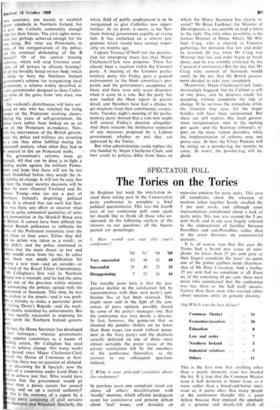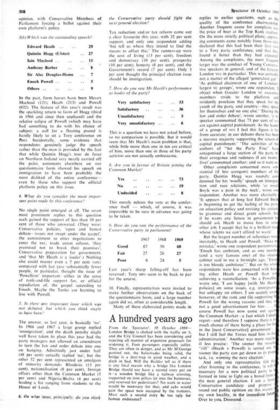SPECTATOR POLL
The Tories on the Tories
At Brighton last week the SPECTATOR in- vited those taking part in the Conservative party conference to complete a brief political questionnaire. This was the fourth year of our conference poll: once again we should like to thank all those who co- operated. In the following analysis of the answers to our questions, all the figures
quoted are percentages.
1. How would you conference? rate this year's
'66 '67 '68
'69
Very successful
62
48
42
49
Successful 31 40 32 35 Disappointing 7 12 26 16
The notable point here is that the pro- gressive decline in the satisfaction felt by representatives with their own party's con- ference has at last been reversed. This might seem odd in the light of the con- sensus of press opinion, possibly shared by some of the party's managers too, that the conference was very nearly a disaster. In fact, however, the goings-on that so shocked the pundits—ballots on no fewer than three issues (an event without prece- dent in the Tory party) and the platform actually defeated on one of them—were almost certainly the prime cause of the greater satisfaction felt by the members of the conference themselves, as the answers to our subsequent questions indicate.
2. What is your principal complaint about the conference?
In previous years one complaint stood out above all others: dissatisfaction with `woolly' motions, which offered inadequate scope for controversy and genuine debate about 'real' issues, and revealed an
excessive concern for party unity. This year all complaints about the selection of motions taken together barely reached the 5 per cent mark; and although some representatives complained about a lack of party unity, this, too, was around the 5 per cent mark, and in any case largely referred to the undercurrent of hostility between Powellites and anti-Powellites rather than to the overt divisions on controversial motions.
It is, of course, true that this year the Tories had a brand new cause of com- plaint: no fewer than 37 per cent gave as their biggest complaint the 'poor' (to quote one of the politer epithets used) chairman- ship of Mr Peter Crossman. And a further 15 per cent had no complaint at all. Even so, of the remaining 48 per cent, there were more who complained that the conference was too short or the hall itself unsatis- factory than there were who worried either about spurious unity or genuine disunity.
3(a) Which was the best debate?
Common Market 34 Economics/taxation 30 Education
8
Law and order 7 Northern Ireland 5 Industrial relations .. .5 Others .. .. 11 This is the first time that anything other than a purely domestic issue has headed the list. It is true that the Common Market issue is half domestic (a butter issue, as it were, rather than a bread-and-butter one); even so, it seems clear that many people at the conference thought this a good debate because they enjoyed the spectacle of a genuine and deeply-felt clash of opinion, with Conservative Members of Parliament forcing a ballot against their own platform's policy.
3(b) Which was the outstanding speech?
Edward Heath ..
29 Quintin Hogg (Ulster) .. 27 lain Macleod .. .. 15
t
Anthony Barber •
1!.
Sir Alec Douglas-Home
7 Enoch Powell ..
5 Others ..
9 In the past, form horses have been Messrs Macleod (121), Heath (213) and Powell (032). The feature of this year's result was the sparkling return to form of Hogg (third in 1966 and since then unplaced) and the relative eclipse of Powell (which may have had something to do with his choice of subject: a call for a floating pound is hardly likely to set a Tory conference on fire). Incidentally, some evidence that respondents genuinely judge the speech rather than the man is provided by the fact that while Quintin Hogg's tour de force on Northern Ireland very nearly carried off the palm, comments elsewhere on our questionnaire form showed his speech on immigration to have been probably the most disliked of the entire conference— even by those who support the official platform policy on this issue.
4. What do you consider the most impor- tant point made by this conference?
No single point emerged at all. The seven most prominent replies to this question each gained the support of less than 1'0 per cent of those who answered. (They were: Conservative policies, 'open and honest debate—issues not swept under the carpet', the commitment to enter negotiations to enter the EEC, trade union reform, 'they promised not to break their promises', Conservative preparation for government, and 'that Mr Heath is a leader'.) Nothing else could muster even a 5 per cent vote: compared with last year substantially fewer people, in particular, thought the issue of 'Powellism' important—either in the sense of rank-and-file support for, or official repudiation of, the gospel according to Enoch. Maybe the Tories are learning to live with Powell.
5. Is there any important issue which was not debated, but which you think ought to have been?
The answer, as last year, is basically 'no'. In 1966 and 1967 a large group replied 'immigration', and the death penalty might well have taken its place this year had the party managers not allowed an amendment to turn the law and order debate into one on hanging. Admittedly just under half (48 per cent) actually replied 'no', but the other 52 per cent represented an amalgam of minority demands: Rhodesia (13 per cent), nationalisation (8 per cent), foreign affairs other than the Common Market (5 per cent) and Nigeria/Biafra (4 per cent) leading a list ranging from students to the House of Lords.
6. On what issue, principally, do you think
the Conservative party should fight the next general election?
Tax reduction and/or tax reform came out a clear favourite this year, with 32 per cent support, and only one respondent adding 'but tell us where they intend to find the means to offset this.' The runners-up were the cost of living (13 per cent), freedom and democracy (10 per cent), prosperity (10 per cent), honesty (8 per cent), and the Government's record (7 per cent). Only 3 per cent thought the principal election issue should be immigration.
7. How do you rate Mr Heath's performance as leader of the party?
Very satisfactory .. 53 Satisfactory .. 36 Unsatisfactory 5 Very unsatisfactory .. 6 This is a question we have not asked before, so no comparison is possible. But it would seem that Mr Heath's main problem is that, while little more than one in ten are critical of him, more than one in three of his party activists are not actually enthusiastic.
8. Are you in favour of Britain joining the Common Market?
Yes .. 73 No .. 19
Undecided .. 8
This merely echoes the vote at the confer- ence itself — which, of course, it was impossible to be sure in advance was going to be taken.
9. How do you rate the performance of the Conservative party in parliament?
1967 1968 1969 Good 67 50 68 Fair 27 26 27 Poor 6 24 5
Last year's sharp falling-off has been reversed: Tory MPS seem to be back to par for the course.
10. Finally, representatives were invited to make further observations on the back of the questionnaire form, and a large number again did so, often at considerable length.
Many of these elaborated points made in
replies to earlier questions, such as the quality of the conference chairmanship. Another frequent cause for complaint was the price of beer at the Top Rank stadium. On the more strictly political plane, approv- ing comments came notably from those who declared that this had been their first visit to a Tory party conference, and that they found it better than they had expected. Among the complaints, the most frequent target was the conduct of Young Conserva- tive speakers in general, and of the Greater London YCS in particular. This was certainly not a matter of the alleged 'generation gap:: 'As political chairman of one of London's largest YC groups', wrote one respondent, object when Greater London YC executive members stride to the platform and stridently proclaim that they speak for the youth of the party and country—they speak for themselves and no one else.' During the law and order debate', wrote another, 'a yc speaker commented that 73 per cent of Yrs are against capital punishment. As the leader of a group of Ycs I feel this figure is far from accurate; in our debates there has been a massive majority supporting the return of capital punishment.' The activities of the authors of "Set the Party Free" have antagonised a large section of the party by their arrogance and rudeness (I am twenty- five)' commented another; and so it went on.
Other complaints concerned more sub- stantial (if less arrogant) members of the party. Quintin Hogg was roundly con demned for his 'woolly' speech on immigra tion and race relations, while 'as usual, Boyle was a pain in the neck'. wrote on respondent. Another was more charitable: 'It appears that at long last Edward Boyl is beginning to get the feeling of the party on education policy and revising his attitud to grammar and direct grant schools. Bu if he wants any future in government h• should ask Heath to move him to son other job. I accept that he is a brilliant ma whose talents we can't afford to waste.'
But the largest number of references wer inevitably, to Heath and Powell. 'Make n mistake,' wrote one respondent portentously 'Enoch has ambition, and as one membe (and a very famous one) of the shado cabinet said to me a fortnight ago, "Enoc is too bloody ambitious".' But on the who respondents were less concerned with bac ing either Heath or Powell than ui achieving a reconciliation. 'As a Powellite. wrote one, 'I am happy [with Mr Heath. policies] on some issues, e.g. immigratlo but unhappy on others. I am acutely °Asa however, of the rank and file supporting N Powell for the wrong reasons and they a not a good advertisement for him . . • course Powell has now come out again the Common Market—a fact which I deep regret—and therefore I suppose there is no much chance of there being a place for hi in the [next Conservative] government .. but I still feel the Tories need him in the administration.' Another was more suconc if less precise: 'The sooner the so-call "rift" (Heath v Powell) is sorted out sooner the party can get down to its prop task, i.e. winning the next election.' And only one representative felt tha after listening to the conference. 'it will necessary for a new political party to formed in time to fight on a broad front the next general election. I am a for Conservative candidate and propose I sound out public opinion on this matter. my own locality, in the immediate futu Over to you, Desmond.



































 Previous page
Previous page